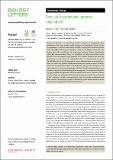Files in this item
Does kin discrimination promote cooperation?
Item metadata
| dc.contributor.author | Faria, Gonçalo | |
| dc.contributor.author | Gardner, Andy | |
| dc.date.accessioned | 2020-03-26T17:30:02Z | |
| dc.date.available | 2020-03-26T17:30:02Z | |
| dc.date.issued | 2020-03 | |
| dc.identifier | 266433347 | |
| dc.identifier | 9369150c-ada9-4f35-9101-3d48fb2f5aa2 | |
| dc.identifier | 85082067137 | |
| dc.identifier | 000521350600003 | |
| dc.identifier.citation | Faria , G & Gardner , A 2020 , ' Does kin discrimination promote cooperation? ' , Biology Letters , vol. 16 , no. 3 , 20190742 . https://doi.org/10.1098/rsbl.2019.0742 | en |
| dc.identifier.issn | 1744-9561 | |
| dc.identifier.other | ORCID: /0000-0002-1511-8680/work/71221661 | |
| dc.identifier.uri | https://hdl.handle.net/10023/19714 | |
| dc.description | Funding: Natural Environment Research Council Independent Research Fellowship (Grant Number NE/K009524/1) and a European Research Council Consolidator grant no. (771387) (A.G.). | en |
| dc.description.abstract | Genetic relatedness is a key driver of the evolution of cooperation. One mechanism that may ensure social partners are genetically related is kin discrimination, in which individuals are able to distinguish kin from non-kin and adjust their behaviour accordingly. However, the impact of kin discrimination upon the overall level of cooperation remains obscure. Specifically, while kin discrimination allows an individual to help more-related social partners over less-related social partners, it is unclear whether and how the population average level of cooperation that is evolutionarily favoured should differ under kin discrimination versus indiscriminate social behaviour. Here, we perform a general mathematical analysis in order to assess whether, when and in which direction kin discrimination changes the average level of cooperation in an evolving population. We find that kin discrimination may increase, decrease or leave unchanged the average level of cooperation, depending upon whether the optimal level of cooperation is a convex, concave or linear function of genetic relatedness. We develop an extension of the classic ‘tragedy of the commons' model of cooperation in order to provide an illustration of these results. Our analysis provides a method to guide future research on the evolutionary consequences of kin discrimination. | |
| dc.format.extent | 4 | |
| dc.format.extent | 352388 | |
| dc.language.iso | eng | |
| dc.relation.ispartof | Biology Letters | en |
| dc.subject | Altruism | en |
| dc.subject | Inclusive fitness | en |
| dc.subject | Jensen's inequality | en |
| dc.subject | Kin selection | en |
| dc.subject | Kin recognition | en |
| dc.subject | Veil of ignorance | en |
| dc.subject | QH301 Biology | en |
| dc.subject | QH426 Genetics | en |
| dc.subject | T-DAS | en |
| dc.subject.lcc | QH301 | en |
| dc.subject.lcc | QH426 | en |
| dc.title | Does kin discrimination promote cooperation? | en |
| dc.type | Journal article | en |
| dc.contributor.sponsor | NERC | en |
| dc.contributor.sponsor | European Research Council | en |
| dc.contributor.institution | University of St Andrews. School of Biology | en |
| dc.contributor.institution | University of St Andrews. Centre for Biological Diversity | en |
| dc.identifier.doi | https://doi.org/10.1098/rsbl.2019.0742 | |
| dc.description.status | Peer reviewed | en |
| dc.identifier.grantnumber | NE/K009524/1 | en |
| dc.identifier.grantnumber | 771387 | en |
This item appears in the following Collection(s)
Items in the St Andrews Research Repository are protected by copyright, with all rights reserved, unless otherwise indicated.

